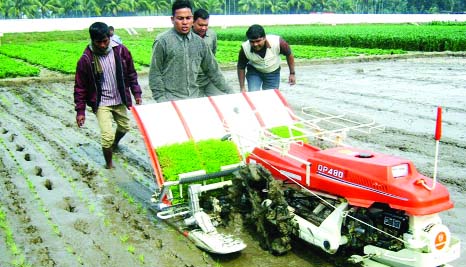
BSS, Rangpur :
Agriculture and environmental experts have said innovation and enhanced cultivation of more stress-tolerant and disease- resistant crops could keep agro-production increasing to ensure food security amid changing climate.
They also viewed that adaptation to changing climate with continuous innovation of time-befitting technologies and mechanisation of agriculture has become imperative to keep crop production increasing for attaining sustainable food security.
Talking to BSS, Knowledge management and communication specialist of the climate resilient agriculture and food security project of World Bank Dr MG Neogi stressed on innovation and popularisation of cultivation of stress-tolerant crops among farmers.
“The adverse impacts of climate change have already changed periods of appearance of different seasons, crop farming and harvesting periods putting no other alternative to innovation of stress tolerant crop varieties to increase food production,” he said.
Former Chief Scientific Officer of Bangladesh Rice Research Institute Dr MA Mazid said the changing climate had been continuously affecting
agriculture, irrigation, navigation, ecology, biodiversity, environment and underground water levels.
“Because of the change already taken place in the overall climatic
patterns, the seasonal rainfalls, floods, dry seasons, periods for sowing or planting seed and seedling and crop harvesting periods have been significantly changed in the northern region,” he said.
Agriculture and Environment Coordinator of RDRS Bangladesh Mamunur Rashid the northern region started experiencing abnormal change in the climatic patterns causing concern to irrigation, agriculture, ecology, bio-diversity and environment.
“As a result, innovation and cultivation of stress tolerant and disease resistant crops has become crucial to keep agro-production increasing amid floods, droughts, cold and hot spells, silting and drying-up of rivers and lowering of underground water levels,” he said.
Horticulture specialist of the Department of Agriculture Extension (DAE)Khondker Md Mesbahul Islam narrated the chronological background that triggered to climate change and its adverse impacts on agriculture,environment and other sectors.
“The adverse impacts of climate change might be even worse than those experienced so far affecting the agriculture sector unless adequate steps were taken to evolve more stress tolerant crops for increasing food production,” he said.
Regional Additional Director of the DAE Shah Alam said lowering of underground water levels and complete drying-up of dozens of rivers and tributaries during the past four decades further degraded the situation in the country’s northern region.
“We must engage our best efforts in innovating newer technologies, strategies and mechanisation of agriculture to enhance cultivation of stress-tolerant crops in all seasons to attain food security keeping agro-production increasing,” he said.
Agriculture and environmental experts have said innovation and enhanced cultivation of more stress-tolerant and disease- resistant crops could keep agro-production increasing to ensure food security amid changing climate.
They also viewed that adaptation to changing climate with continuous innovation of time-befitting technologies and mechanisation of agriculture has become imperative to keep crop production increasing for attaining sustainable food security.
Talking to BSS, Knowledge management and communication specialist of the climate resilient agriculture and food security project of World Bank Dr MG Neogi stressed on innovation and popularisation of cultivation of stress-tolerant crops among farmers.
“The adverse impacts of climate change have already changed periods of appearance of different seasons, crop farming and harvesting periods putting no other alternative to innovation of stress tolerant crop varieties to increase food production,” he said.
Former Chief Scientific Officer of Bangladesh Rice Research Institute Dr MA Mazid said the changing climate had been continuously affecting
agriculture, irrigation, navigation, ecology, biodiversity, environment and underground water levels.
“Because of the change already taken place in the overall climatic
patterns, the seasonal rainfalls, floods, dry seasons, periods for sowing or planting seed and seedling and crop harvesting periods have been significantly changed in the northern region,” he said.
Agriculture and Environment Coordinator of RDRS Bangladesh Mamunur Rashid the northern region started experiencing abnormal change in the climatic patterns causing concern to irrigation, agriculture, ecology, bio-diversity and environment.
“As a result, innovation and cultivation of stress tolerant and disease resistant crops has become crucial to keep agro-production increasing amid floods, droughts, cold and hot spells, silting and drying-up of rivers and lowering of underground water levels,” he said.
Horticulture specialist of the Department of Agriculture Extension (DAE)Khondker Md Mesbahul Islam narrated the chronological background that triggered to climate change and its adverse impacts on agriculture,environment and other sectors.
“The adverse impacts of climate change might be even worse than those experienced so far affecting the agriculture sector unless adequate steps were taken to evolve more stress tolerant crops for increasing food production,” he said.
Regional Additional Director of the DAE Shah Alam said lowering of underground water levels and complete drying-up of dozens of rivers and tributaries during the past four decades further degraded the situation in the country’s northern region.
“We must engage our best efforts in innovating newer technologies, strategies and mechanisation of agriculture to enhance cultivation of stress-tolerant crops in all seasons to attain food security keeping agro-production increasing,” he said.
Alam also appreciated the success already achieved by farmers in cultivating newly innovated flood-, drought- and saline- tolerant rice, stress tolerant and disease resistant wheat, maize and other crop varieties to increase food output in Bangladesh to feed the growing population.

